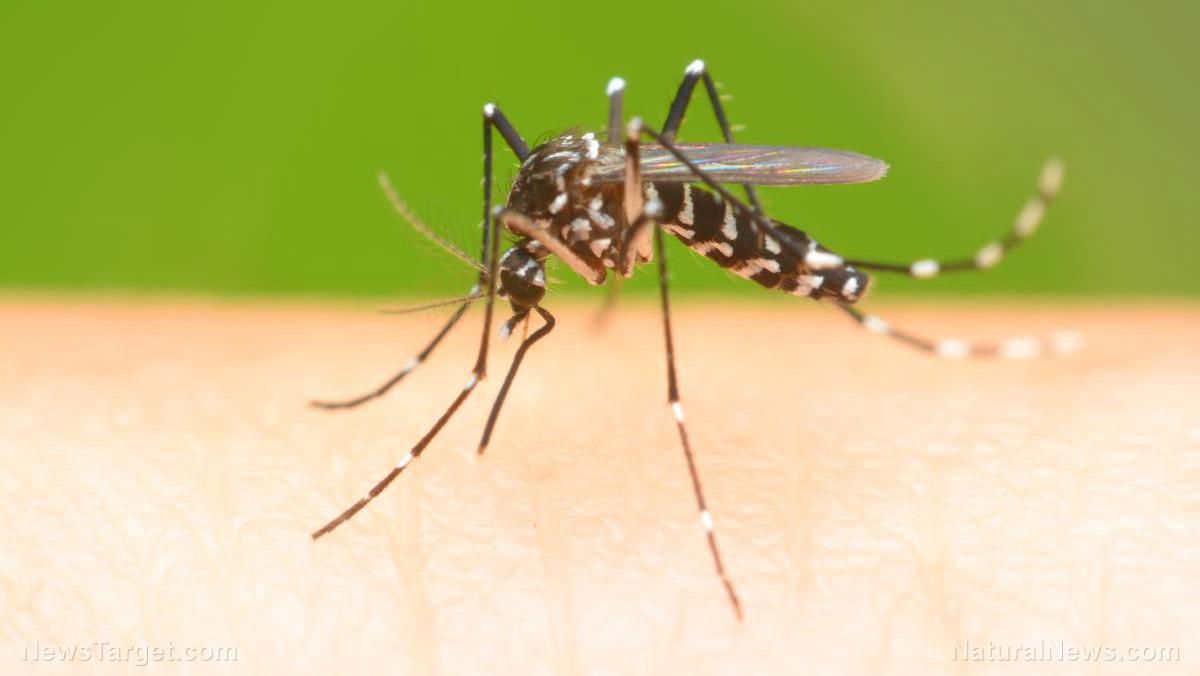Silent invasion: Genetically modified mosquitoes released in U.S. backyards amidst public outcry
04/07/2025 / By Willow Tohi

- Oxitec released genetically modified (GM) male Aedes aegypti mosquitoes in Florida on April 29, 2025, marking the first such experiment in the U.S., despite public opposition and regulatory concerns.
- Independent studies, including a 2019 Yale analysis of Oxitec’s Brazil trials, found GM mosquitoes did not fully die off, leading to hybrid offspring that may be more resistant to disease control measures. Trials in the Cayman Islands also fell short of promised suppression rates.
- The EPA fast-tracked approval using Oxitec-funded studies, ignored public petitions (over 250,000 objections), and overlooked scientific warnings, while internal emails revealed industry lobbying to push the project forward.
- No long-term studies exist on ecological impacts, including disruptions to food chains or unintended mutations. Oxitec has refused to release complete trial data, raising accountability concerns.
- The article urges public resistance, demanding transparency from regulators, pressuring local officials for moratoriums, raising awareness, and rejecting corporate-driven biotech solutions in favor of natural alternatives.
In a brazen disregard for both ecological integrity and public consent, British biotech firm Oxitec has unleashed thousands of genetically modified (GM) mosquitoes into the Florida Keys — marking the first-ever release of GM mosquitoes in the United States. On April 29, 2025, workers placed water-filled boxes containing GM mosquito larvae in six residential yards, triggering the hatch of an estimated 12,000 modified male Aedes aegypti mosquitoes per box. Marketed as a “solution” to disease-carrying pests, these lab-engineered insects are part of an unprecedented biotech experiment, approved by the deeply compromised EPA, despite glaring scientific and ethical concerns.
What makes this release even more alarming? No independent long-term safety studies. No real public consent. And a regulatory system that prioritizes corporate interests over human and environmental well-being.
The flawed science behind Oxitec’s “friendly” mosquitoes
Oxitec’s GM mosquitoes are designed with a self-limiting gene that supposedly causes offspring to die before reaching maturity, thereby reducing wild mosquito populations. Yet real-world evidence suggests this technology is far from foolproof — and may actually backfire catastrophically.
- A 2019 Yale study, published in Scientific Reports, analyzed Oxitec’s Brazil trials and found that the modified mosquitoes did not simply die off as projected. Instead, hybrid mosquitoes emerged — some potentially more resistant to disease control measures.
- The Cayman Islands trials, where Oxitec first tested its GM mosquitoes, failed to meet their claimed 90% suppression rate, only achieving a 62% reduction in target populations.
- No long-term ecological impact studies have been conducted to assess what happens when GM mosquitoes interact with other species — raising fears of disrupted food chains and unforeseen mutations.
Despite these red flags, Oxitec refuses to release full trial data—a clear sign that corporate profits, not public safety, are driving this agenda.
Regulatory corruption: How the EPA sold out to Big Biotech
The EPA’s approval process for Oxitec’s GM mosquitoes reeks of corporate influence and regulatory capture.
- Political pressure: Internal emails obtained via Freedom of Information Act (FOIA) requests reveal that Oxitec lobbyists—including former Texas GOP finance chair Roy Bailey—pressured the EPA to fast-track approval, using misleading claims that these mosquitoes could “eradicate Zika”, despite zero local Zika cases in the U.S. since 2017.
- No independent review: The EPA relied solely on Oxitec-funded studies, ignoring warnings from independent scientists about potential risks.
- Public opposition ignored: Over 250,000 Florida residents petitioned against these releases, yet the EPA greenlit the project anyway, proving yet again that government agencies serve corporations, not citizens.
“This is a classic case of biotech colonialism,” says Diana Reeves of GMO Free USA. “A foreign corporation is testing an unproven science experiment on an unwilling public, while regulators look the other way.”
The bigger picture: A history of biotech failures
The push for GM mosquitoes follows the same deceptive playbook used by agrochemical giants like Monsanto (now Bayer) in promoting unsafe GMO crops and toxic pesticides.
- Roundup-Ready Crops were sold to farmers as “safe” and “necessary” before being linked to massive herbicide overuse, ecosystem damage and cancer.
- Neonicotinoid pesticides, falsely marketed as “bee-safe,” contributed to global pollinator collapse.
Now, Oxitec is exploiting fear of mosquito-borne diseases to push yet another untested technology — one that could trigger ecological chain reactions people don’t yet understand.
How you can fight back
This GM mosquito experiment is just the beginning. Oxitec, backed by deep-pocketed investors, plans to expand to Texas and beyond. But concerned citizens aren’t powerless. Here’s what you can do:
- Demand full transparency – The EPA must release all Oxitec trial data and conduct independent ecological risk assessments under the Endangered Species Act.
- Challenge local officials – Write to your representatives and demand moratoriums on GM mosquito releases until safety is proven.
- Spread awareness – Many people don’t even know this experiment is happening. Share documentaries, articles and petitions exposing the dangers of corporate-controlled genetic engineering.
- Reject pesticide-based “solutions” – If GM mosquitoes disrupt ecosystems, governments may respond with even more toxic chemical sprays—harming bees, birds and human health.
A biotech nightmare in the making
The Florida Keys experiment is not about public health — it’s about profits. Oxitec’s GM mosquitoes represent another step toward a dystopian future where corporations wield unchecked power over nature, immune to accountability.
Playing God with ecosystems leads to disaster. From invasive species to pesticide-resistant superbugs, human interference has a track record of catastrophic unintended consequences.
Sources include:
Submit a correction >>
Tagged Under:
big government, biological weapon, biotech, bioterrorism, biowar, Censored Science, Dangerous, Ecology, ecosystem, environment, EPA, genetic lunacy, GM mosquito, GMO, insanity, outrage, research, science deception, science fraud, suppressed, toxins
This article may contain statements that reflect the opinion of the author
RECENT NEWS & ARTICLES
COPYRIGHT © 2017 BIG GOVERNMENT NEWS





















